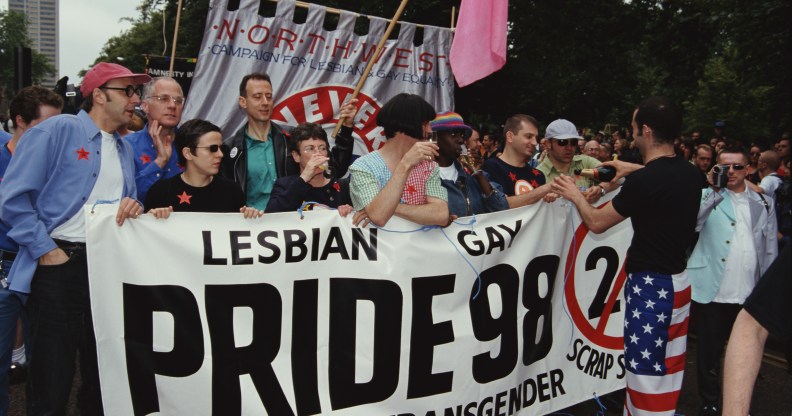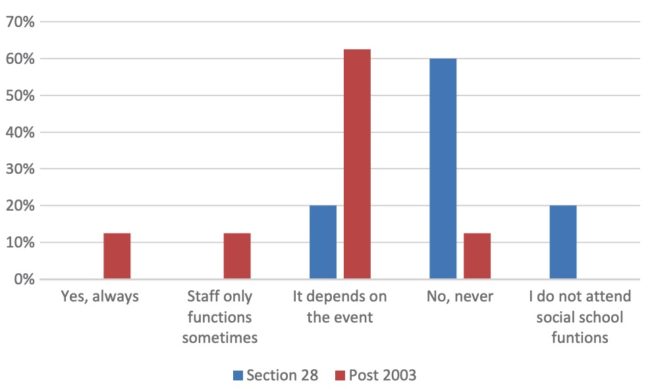Section 28 LGBT teachers remain less likely to be out at school

Comedian Rhona Cameron and political activist Peter Tatchell help to hold a banner at the Lesbian, Gay, Bisexual, and Transgender Pride event, London, 4th July 1998. The banner calls for an end to Section 28 which refers to the teaching and promotion of homosexuality by local authorities. ( Steve Eason/Hulton Archive/Getty Images)
LGBT+ teachers who were working at the time of Section 28 are still feeling the repercussions of the climate of homophobia, new research indicates.
A study published this month in the peer-reviewed journal Sex Education indicates that LGBT+ teachers who had been working under the Section 28 legislation—which prohibited local authorities and schools from “promoting” homosexuality—remain less likely to be out at work, thus affecting both their performance, their career prospects and their mental health.
Lead researcher Dr Catherine Lee at the Anglia Ruskin University tells PinkNews she was a teacher herself at the time of Section 28.
Currently working with a number of LGBT+ teachers as part of the Courageous Leaders programme—which provides mentoring, training and support for LGBT+ teachers aspiring to become school leaders—she noticed a difference in attitudes between those who had worked during the Section 28 era, and those who became teachers after the law was repealed across the UK in 2003.
“Teachers who had experienced Section 28 interacted very differently [with] their work environments when compared with those entering the teaching only after its repeal,” she said.
For her research, Lee surveyed a group of 105 LGBT+ teachers, both men and women, 46 percent of whom were working at the time of Section 28.
Section 28 LGBT+ teachers continue to feel impact of self-censorship and surveillance
In the paper, Lee noted “the climate of fear and homophobia that LGBT+ teachers endured in their day-to-day lives at school” was being fostered particularly by tabloid newspapers, which also opposed the repeal of Section 28 with headlines such as one dated 2000 from The Daily Mail, reading: “Keep this out of Our Schools.”
“When every child is positioned as a potential victim of abuse, every teacher is positioned as their potential abuser,” Lee wrote in the paper.
“This climate of fear around teachers, schools and sexuality had a powerful adverse effect on the lives of LGBT+ teachers, forcing them to engage in damaging self-censorship and surveillance.”
Among Lee’s findings is that only 20 percent of LGBT+ teachers who worked under Section 28 are out to all school colleagues and their pupils. In contrast, 88 percent of LGBT+ teacher who started after 2003 are out to all their colleagues and 45 percent are out to their pupils.
“Can you imagine, the head turning up to the Christmas play with his boyfriend? But then not having a partner there would look equally weird.”
— One of the LGBT+ teachers who participated in the study
Some of those who remain closeted at work expressed their frustration at not being able to be a role model to their LGBT+ students.
“I know that I have a responsibility to LGBT+ kids in school and it upsets me when I see them struggling like I did . . . but I worry what parents will think of me if I try to help,” one survey respondent wrote.
No LGBT+ teacher of the Section 28 era described running Pride clubs and other extra-curricular activities for LGBT+ pupils and allies at school, and a majority of them reported never attending social events at school due to wanting their personal and their professional lives kept as separate as possible.
Some of them admitted they do not pursue career progression that would require a public profile.
“I don’t ever want to be a headteacher, it’s all the social events that puts me off. Can you imagine, the head turning up to the Christmas play with his boyfriend? But then not having a partner there would look equally weird,” one respondent said.

A majority of Section 28 era LGBT teachers reported never attending social events at school. (Lee, C. 2019. “Fifteen years on: the legacy of section 28 for LGBT+ teachers in English schools,” Sex Education)
However, fewer Section 28 era LGBT+ teachers (20 percent) reported experiences of homophobia within the last five years compared to 38 percent of those who began teaching after 2003.
According to Lee, this may either be because post-2003 LGBT+ teachers perceive homophobia more acutely, or that Section 28 era teachers hide their sexuality at work and are therefore less visible as potential targets of homophobia.
In some cases, homophobia appears in subtle forms. One post-2003 respondent wrote: “I haven’t faced explicit homophobia in my workplace, but I find that my applications for new jobs go further when I do not include [reference to] my school LGBT inclusion work.”
Notably, none of the Section 28 era LGBT+ teachers reported leaving a role due to homophobia or heteronormativity, while 15 percent of the post-2003 respondents did.
Ghost of Section 28 haunts debate on LGBT-inclusive lessons
Lee’s study, published 15 years after the repeal of Section 28—meaning the law has been repealed for as long as it was in place—indicates that the legislation’s negative legacy endures.
Lee’s paper acknowledged that Section 28 was only one of the elements that may have influenced the experience of LGBT+ teachers, but it noted that the climate during the period it was implemented was particularly detrimental to LGBT+ people.
“Whilst a climate of oppression, discrimination and harassment of the era also contributed to LGBT+ teachers’ experiences, there is a legacy of caution, self-censorship and complex identity management, that many teachers entering the profession after 2003 do not share,” Lee wrote.
“Even though Section 28 was repealed fifteen years ago, schools are still not fully inclusive work places for LGBT teachers, students or parents.”
— Dr. Catherine Lee
More than a decade since the repeal of Section 28, the debate surrounding what can be taught at school about sexual orientation, gender identity and LGBT+ relationships has yet to subside.
Recent controversy surrounding a LGBT-inclusive programme called No Outsiders, launched by an openly gay teacher at a Birmingham school, is just one example of how some groups remain oppose to teachers and teachings inclusive of the LGBT+ experience.
Lee tells PinkNews: “Even though Section 28 was repealed fifteen years ago, schools are still not fully inclusive work places for LGBT teachers, students or parents.
“The recent protests related to the work that Parkfield Community School is doing as part of its No Outsiders Project demonstrates this, with scenes sadly reminiscent of some 30 years ago when the book Jenny Lives with Eric and Martin set in motion a train of events resulting in Section 28.”

